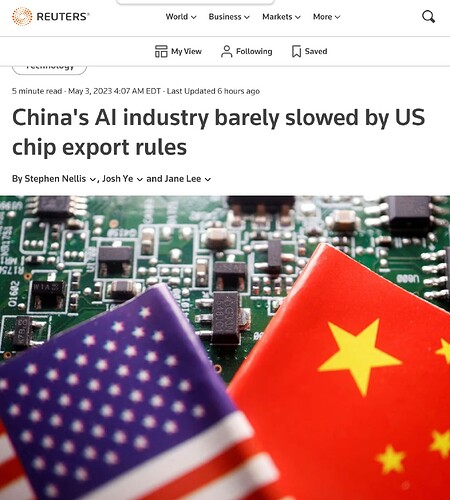-
美国去年实施了微芯片出口管制,以冻结中国开发用于开发核武器和人工智能系统的超级计算机,这对中国的科技行业影响甚微。英伟达公司(Nvidia Corp)为中国市场创造了其芯片的变种,这些变种被放慢以满足美国的规则,但即使这些变种对中国公司来说也是一种改进。美国的策略是避免造成冲击,使中国放弃美国的芯片,而加倍自己的芯片开发努力。
-
出口限制有两个部分;第一个部分对芯片计算极其精确的数字的能力设置了上限,这一措施旨在限制可用于军事研究的超级计算机。但是计算极其精确的数字在人工智能工作中的意义不大,而Nvidia正在向中国的技术公司出售H800,用于此类工作。美国政府并不寻求损害竞争或美国工业,并允许美国公司为商业活动提供产品。
-
Nvidia的首席科学家说,随着时间的推移,两个市场之间的差距将迅速扩大,因为培训要求每六到十二个月就会翻一番。美国商务部负责监督这些规则的部门–工业和安全局没有回复评论请求。
-
美国对芯片间的传输速度进行了限制,这影响了ChatGPT等AI技术。这个限制还不到中国境外旗舰H100芯片峰值速度的一半。然而,人工智能行业的一些人认为,这个速度仍然是足够的,可以通过算法来解决。
-
金钱有助于减轻美国速度限制的影响,因为中国的芯片需要两倍的时间来完成一项任务,仍然可以完成工作。此外,人工智能研究人员正在对庞大的系统进行瘦身,以降低培训成本,并需要更少的芯片,这就减少了速度限制的影响。
-
两年前,业界期待人工智能模型变得越来越大,但由于人工智能研究人员对庞大的系统进行瘦身,这一出口限制的影响较小。这一出口限制是明显的,但没有像它可能带来的破坏性。
-
U.S. microchip export controls imposed last year to freeze China’s development of supercomputers used to develop nuclear weapons and artificial-intelligence systems have had minimal effects on China’s tech sector. Nvidia Corp has created variants of its chips for the Chinese market that are slowed down to meet U.S. rules, but even these are an improvement for Chinese firms. The U.S. strategy was to avoid a shock that would cause China to ditch U.S. chips and redouble their own chip-development efforts.
-
The export restrictions have two parts; the first puts a ceiling on a chip’s ability to calculate extremely precise numbers, a measure designed to limit supercomputers that can be used in military research. But calculating extremely precise numbers is less relevant in AI work, and Nvidia is selling the H800 to Chinese technology firms for use in such work. The U.S. government isn’t seeking to harm competition or U.S. industry, and allows U.S. firms to supply products for commercial activities.
-
Nvidia’s chief scientist said that the gap between the two markets will grow quickly over time, as training requirements double every six to twelve months. The Bureau of Industry and Security, the arm of the U.S. Commerce Department that oversees the rules, did not return a request for comment.
-
The U.S. has put a limit on chip-to-chip transfer speeds, which affects AI technologies such as ChatGPT. This limit is less than half the peak speed of the flagship H100 chip outside China. However, some in the AI industry believe that the speed is still plenty and can be worked around algorithmically.
-
Money helps to mitigate the effect of the U.S. speed limit, as a chip in China taking twice as long to finish a task can still get the work done. Additionally, AI researchers are slimming down the massive systems to reduce the cost of training and require fewer chips, which lessens the impact of the speed limits.
-
Two years ago, the industry was expecting AI models to get bigger and bigger, but this export restriction has less of an impact due to AI researchers slimming down the massive systems. This export restriction is noticeable, but not as devastating as it could have been.
1 Like
